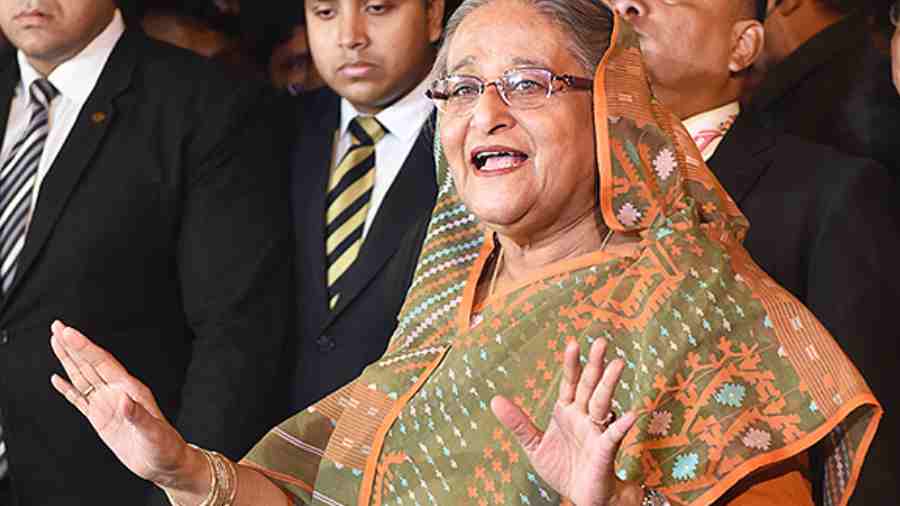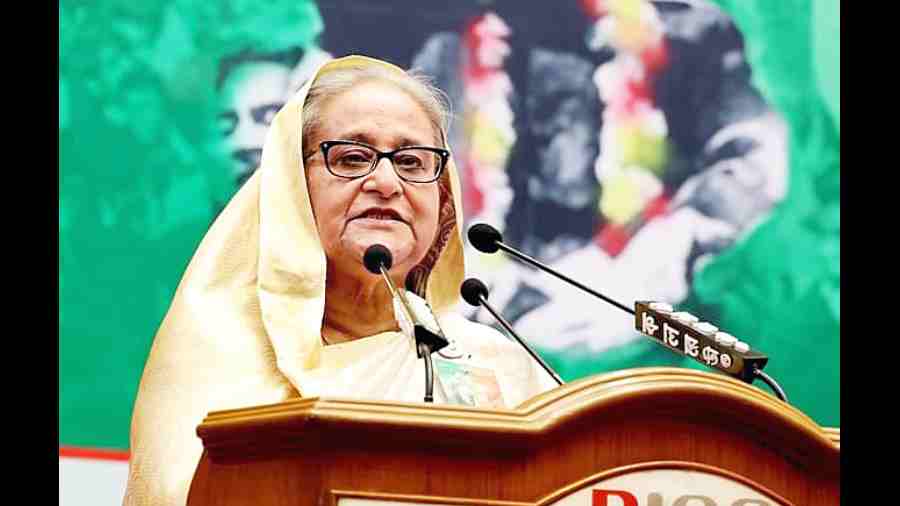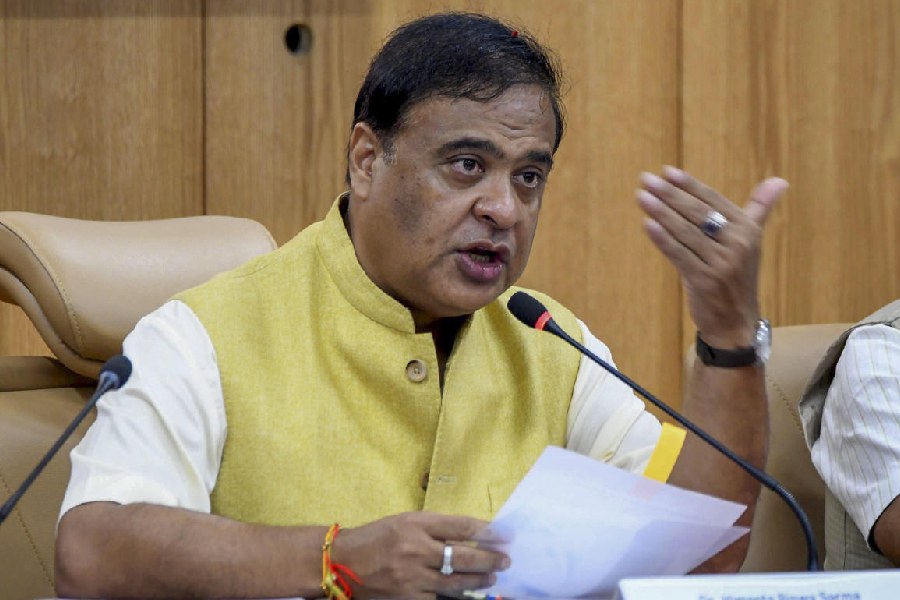Bangladesh Prime Minister Sheikh Hasina on Wednesday said she wanted to transform the country into a "Smart Bangladesh" by 2041, launching a new catchphrase ahead of the general election, expected in December 2023.
"If the Bangladesh Awami League forms the government again, our vision is to build a 'Smart Bangladesh' by 2041," she told the country's parliament.
Hasina added that she dreamt of transforming every village into a township.
Less than 24 hours earlier, Hasina had outlined the same vision at a party event held to commemorate her father Sheikh Mujibur Rahman's return to Bangladesh on January 10, 1972 — following independence — from Pakistan where he had been jailed.
Target taglines are not new to Bangladesh. Rahman, who led the country's freedom struggle, had dreamt of a "Sonar Bangla" free from hunger, poverty, corruption, illiteracy, communalism and ignorance.
In the run-up to the 2008 elections, Hasina had rolled out her vision for 2021 with a new slogan: "Digital Bangladesh".
It's the economy
Hasina's economic scorecard during her three successive terms as Prime Minister has been impressive. Bangladesh has witnessed phenomenal economic growth over the last 14 years, emerging as South Asai's fastest-growing economy and graduating from "less developed" to "developing" country.
Efforts to sustain this growth through investments in infrastructure are visible across the country, which has built a road-cum-rail bridge on the Padma, spent generously on metro linkages, and augmented port infrastructure in the last few years.
The focus will be retained, Hasina stressed.
"A Smart Bangladesh will be founded on its smart citizens, smart economy, smart government and smart society," Hasina said, sounding confident about her return to power.

Sheikh Hasina File picture
Growth vs prices
Most ruling party leaders in Bangladesh betray a kind of smugness during discussions about the economy.
"We don't have abject poverty and the problem of hunger has been tackled," Hasan Mahmud, information minister, told a team of Indian journalists who were visiting the country on an invitation from his ministry.
"Our Opposition parties claimed that people would die of hunger from the impact of Covid, but not a single such case has been reported. You may see some beggars on the streets: most of them will refuse to accept anything less than 20 takas."
The economic success story was the dominant theme of the speeches delivered at Tuesday's event commemorating Rahman's homecoming.
Most of the claims on the economy made by Awami League leaders are incontestable. However, Bangladesh has during the past two-and-a-half years or so also seen the prices of essential goods rise, job opportunities shrink and remittances from its overseas workforce of 1 crore dry up.
Many ordinary people this correspondent met in Dhaka and Chittagong spoke at length about their economic woes and accused the government of not doing enough.
"The price rise is a huge problem; the cost of living is an issue. If we can't find a solution, it (the electoral battle) will get difficult," Obaidul Qader, Awami League general secretary, told Indian journalists.
The latest data from the Bangladesh Bank shows that inflation has been falling for the past four months, and stood at 8.71 per cent in December, down 14 basis points from the previous month. But the prices are still pinching the ordinary Bangladeshi.
Main players
The electoral battle is between the Awami League and the Opposition alliance led by the Bangladesh Nationalist Party (BNP), which boycotted the 2013 elections as its principal demand for the polls to be held under a caretaker government was not met.
The BNP did field candidates in the 2018 elections, but it was a half-hearted participation. The party won only 7 of the 300 seats in the national legislature.
However, the BNP’s visibility has increased over the past few months courtesy street protests across the country against Hasina's "authoritarian" rule. Some of the protests drew huge crowds, prompting the Opposition to declare an imminent change of guard in Dhaka.
Despite these claims, the BNP seems in disarray because of the prolonged illness of its chairperson, Begum Khaleda Zia, and the absence of her exiled son Tareq Rahman, who faces a slew of corruption and other criminal charges in Bangladesh.
'Anti-incumbency'
Some political observers think the Awami League’s biggest challenge will be the anti-incumbency sentiment, stemming from the economic woes of ordinary people, corruption charges against the party's leaders, and allegations of human rights violations by the government.
"The BNP and its partners have no concrete vision or plan for the country but if they carry on with their movements and contest the election properly, they will surely benefit from the anti-incumbency mood," said an observer, who did not wish to be quoted.
Salim Mahmud, secretary, information and research, in the central executive committee of the Awami League, swatted away the anti-incumbency hypothesis.
"We will benefit from pro-incumbency. People have benefited from this government's rule and have faith in our leader. Besides, people think that this government will stay," he said.
Mahmud said the charges of human rights violations were fabricated. "Given the situation in our country, we need the guardianship of Sheikh Hasina and certain degrees of control so that vested interest groups cannot create anarchy and halt our growth run," he said.
Asked about the possible role of authoritarianism in fostering economic growth, he referred to the Singapore model of Lee Kwan Yew, making the Awami League philosophy clear.
Comparisons with past governments — led by Ziaur Rahman, his wife Khaleda and Hussain Mohammad Ershad — show that the last 14 years under Hasina have been the best for Bangladesh in terms of economic growth.
Hasina has also had remarkable success in controlling terrorism and communal forces, and in keeping the army restricted to the barracks.
However, the Prime Minister, who turns 76 this September, is aware that performance alone may not be enough. "I wonder at times whether those who are 20 now can remember what the country was like 14 years ago," she said at Tuesday's event.
The question is politically significant, for over a fourth of the country's people — most of whom have suffered immensely from the pandemic and the Ukraine war — are aged between 15 and 29.
"These youths don't know the ugly side of the BNP and its alliance partners like the Jamaat. Our campaign will highlight the differences between the two parties (the Awami League and the BNP) and their approaches," said Muhammad Ali Arafat, central executive committee member, the Awami League.











